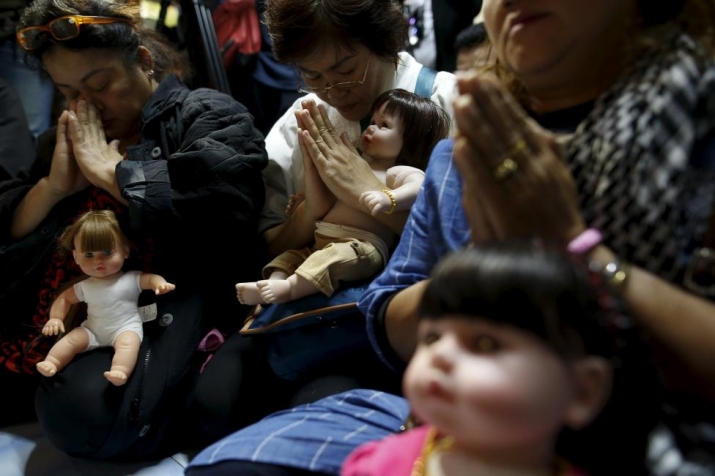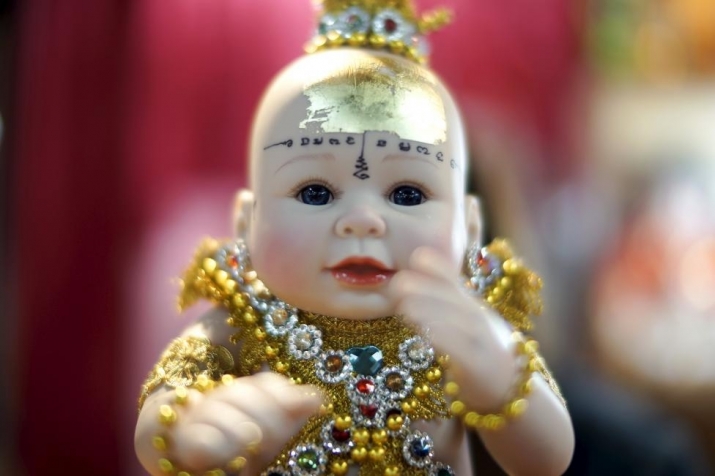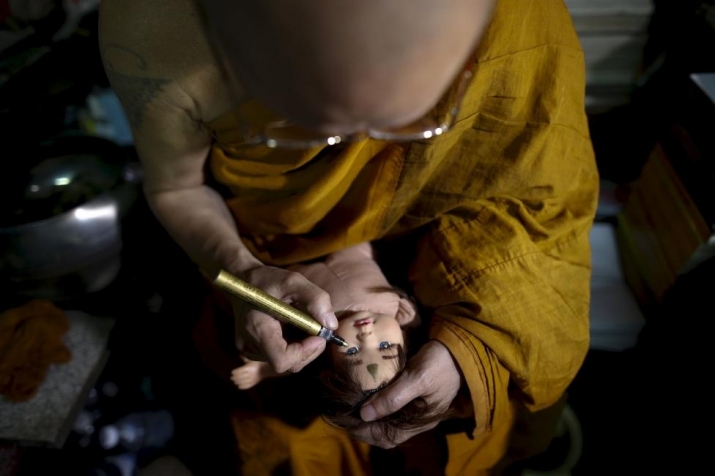NEWS
Is Thailand’s “Angel Child” Craze Nearing its End?
 Luk thep owners receive a blessing ritual for their dolls from a Buddhist monk at Bua Khwan Temple in Nonthaburi, Thailand. Photo by Athit Perawongmetha. From reuters.com
Luk thep owners receive a blessing ritual for their dolls from a Buddhist monk at Bua Khwan Temple in Nonthaburi, Thailand. Photo by Athit Perawongmetha. From reuters.comThe luk thep, or angel child, craze that has been sweeping the predominantly Buddhist kingdom of Thailand, where a growing number of people have taken to carrying around and caring for eerily lifelike plastic dolls as if they were real children, has been making headlines across the globe. However, recent reports suggest that the fad may already be losing some traction.
The syncretic nature of the Theravada Buddhism widely practiced in Thailand allows for the observance of many animist and Hindu traditions, as well as astrology and “black magic,” with amulets and other good-luck charms a widely accepted fact of life. Adherents of the luk thep trend take such attitudes to another level by treating their dolls as surrogate children, taking them about in public, buying them clothes, and offering them food, all in the belief that caring for their totems will bring them luck, happiness, and success.
To luk thep owner Natsuda, 45, her doll is every bit as real as her living 21-year-old daughter. “We sleep in the same bed together, she has her own pillow and blankets,” she says of the doll. “We didn’t switch the air-con on two nights ago because she was cold. In the morning, she likes to drink strawberry milk.” (The Star Online)
The craze for the dolls, which sell for Bt1,500–40,000 (US$40–8,000), has been interpreted by some as a reflection of a deep-seated insecurity felt by many members of Thai society in the face of economic uncertainty and political division. Yet it has become so widespread that some airlines, bus operators, restaurants, and other companies now offer special services for the dolls and their devoted owners.
 A luk thep doll in a Bangkok department store. Photo by Athit Perawongmetha. From reuters.com
A luk thep doll in a Bangkok department store. Photo by Athit Perawongmetha. From reuters.comNevertheless, the tide of favor may now be turning against such practices. The Civil Aviation Authority of Thailand is planning to stop airlines from selling seats for the dolls, which it insists should be treated as carry-on luggage. The statement came just days after police reported seizing a luk thep doll filled with methamphetamine pills at Thailand’s Chiang Mai Airport.
Last week, Thailand’s Sangha Supreme Council and the National Office of Buddhism expressed the discomfort felt in more official circles, issuing notices forbidding monks from performing the ritual known as “Plook Sek,” which invites a child’s spirit to possess the luk thep doll.
While conceding that the practice was not a contravention of Buddhist principles, respected monk Phra Ajarn Winai Thitipanyo earlier last month urged people to recognize and differentiate between legitimate religious practices and superstition. Another monk, Phra Buddha Issara, known for his fiery denunciations of commercialism within mainstream Thai Buddhism, was less circumspect in expressing his opinion: “It reflects that society is perverse,” he said. “If you’re lonely . . . you can just go out and talk to your neighbors, interact more with others, do good things for public, help the blind, sweep floors or grow plants.” (The Star Online)
 A Buddhist monk anoints a doll during a blessing ritual. Photo by Athit Perawongmetha. From reuters.com
A Buddhist monk anoints a doll during a blessing ritual. Photo by Athit Perawongmetha. From reuters.comThe end may already be in sight for some luk thep. Around 20 dolls were reportedly dumped at a temple on the outskirts of Bangkok. Temple official Sarawuth Pailonrin said owners had been leaving their dolls at the temple following increasingly vocal criticism from skeptics. “Some people don’t feel comfortable [keeping their luk thep] anymore so they dumped the dolls under our Bodhi tree,” he said. “Some came at night. Some talked to the abbot, who allowed them to leave the dolls here.” (Coconuts Bangkok)
See more
Thais turn to 'child angel' dolls as economy struggles (Reuters)
Lucky or Chucky? Thai spirit dolls delight and disturb (The Star Online)
Sangha Supreme Council meets to curb ritual performance for child angels (Thai PBS)
Temple puts up “No Ritual” performance notice amid child angel fever (Thai PBS)
CAAT curbs 'angel child' tickets (Bangkok Post)
End of Look Thep mania: 'Child Angels' dumped as orphans at temple (Coconuts Bangkok)
Thailand’s Child Angel Doll Owners Believe the Dolls Bring Good Luck (Chiangrai Times)
Buddhistdoor View: The Perils of Spiritual Materialism (Buddhistdoor Global)














